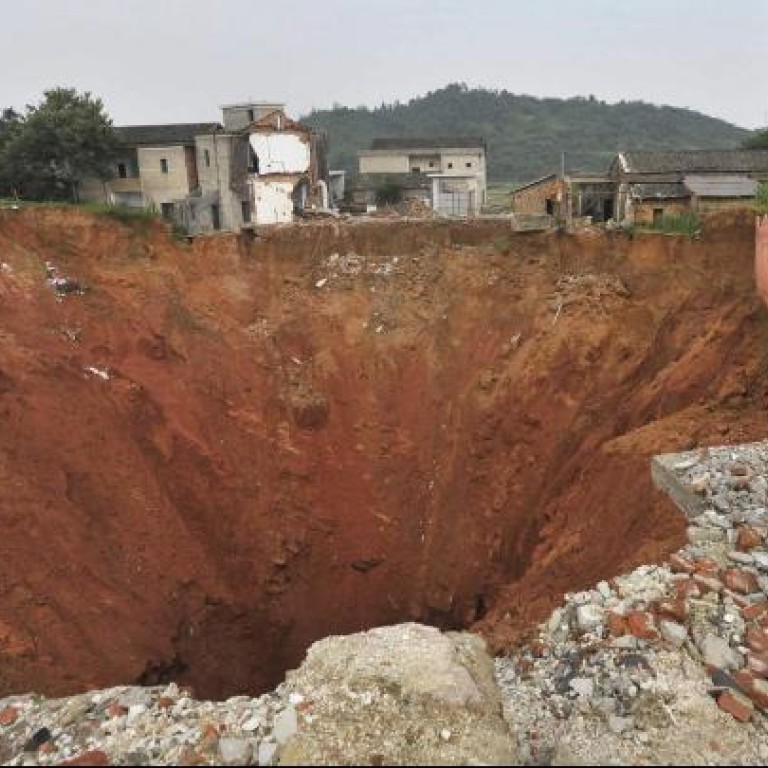
Shoddy work leaves trail of sinkholes, collapsed bridges across mainland
Shoddy construction has left a trail of sinkholes and collapsed bridges across the mainland
Rushed and irresponsible construction has made many roads death traps, according to experts.
They point to a spate of incidents involving random sinkholes in at least nine cities last month that killed four people and injured several others.

Professor Song Xiang, who teaches civil engineering at Tsinghua University, recently urged construction authorities not to overlook the significance of the recent accidents, adding that "construction loopholes have already cost lives and left the public scared".
The latest ground collapse to make headlines occurred in Zhengzhou , Henan , on September 2, when a 500-square-metre area of land collapsed alongside an elevated section of a state road after heavy rain.
And over the past three weeks, Harbin , in the northern province of Heilongjiang , has had at least nine instances of cavities appearing in the ground. Two people died and two were injured, including a 14-month-old girl.
The latest sinkhole there occurred on August 29, and the hole was five metres deep. No one was injured.
One Harbin resident was quoted by the as saying that she dared not leave her home or walk along the street, fearing she might fall into a hole.
Also on August 29, a large section of road in Handan , Hebei , collapsed, and a taxi with a driver and passenger tell into the three-metre-deep hole, Xinhua reported.
Nearly a week earlier, at a university campus in Shenyang , Liaoning , the wheel of a big truck loaded with sand broke through the road, tipping the truck and spilling sand that buried two workers. One died from suffocation, according to the .
On the same day, four road cave-ins occurred in different places in Zhengzhou when the city was inundated by heavy rain.
In one of the accidents, a cyclist fell into a hole, receiving minor injuries, according to the .
The next day, a large hole appeared in a road near a railway line in Jinan , Shandong , the reported.
Also last month, two sinkholes appeared on roads in Beijing's Haidian district, a bus fell into a road cavity in Nanjing , Jiangsu , and a man in Dalian , Liaoning , fell into a sinkhole while walking and suffered serious burns from hot-water pipes.
Harbin, like most other cities with sinkholes, said its accidents were due to heavy rainfall that eroded the ground below the surface, particularly under dilapidated roads. But residents were quoted by the as saying the accidents also happened under newer roads.
Fu Chonglan, a researcher in urban development at the Chinese Academy of Social Sciences, said there were various reasons for sinkholes appearing.
But the frequency with which they had occurred recently could be attributed to the rushed construction of roads in the past decade.
"Workers and engineers want to complete the project as soon as possible so they can pick up the next project. Therefore, due diligence may not be given," he said.
"After laying the roadbed, workers should leave it for half a year to let the soil in the foundation subside naturally and to allow any tiny holes in the soil to be filled. Only in this way is soil pressed tightly enough that water can't easily penetrate."
Song also noted that there had been many underground projects in cities over the past few years, but not all of these had undergone proper assessments to determine the possible hazards they might cause.
That lack of due diligence was one likely cause of some sinkholes, he said, adding that many sinkholes could be attributed to excessive exploitation of underground water resources across the country.
Professor Dai Guoliang, who teaches civil engineering at Southeast University in Nanjing, said workers on some projects did not study where underground pipe networks in the area were before starting construction.
Other roads, he said, were not designed to handle the weight they would be subject to in order to save money.

